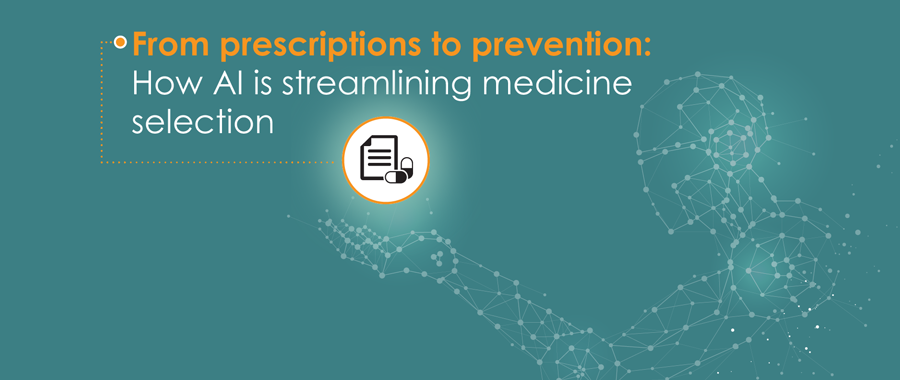
How AI is streamlining medicine selection
Healthcare is abuzz with all the ways AI can be used as a tool to augment a doctor’s clinical judgment. We’ve seen AI used in drug development, rare disease research, medical imaging analysis & more. It’s no surprise then that AI is being applied to medicines management to make prescribing faster, easier for doctors & safer for patients.
In today’s medical landscape, there is a staggering number of over 120,000 active drugs available in South Africa. Multiplied by numerous generic equivalents, prescribing the right medication can be far from straightforward. This complexity makes it easy to understand why doctors sometimes default to prescribing expensive brand-name drugs before a pharmacist offers the patient a generic alternative. While widely accepted, this practice is becoming more problematic because medical schemes are getting stricter about only covering medicines that are prescribed by their exact name. When combined with prescribing errors, doctors are under even more pressure to get it right the first time.
Let’s look at some common medicine errors & why they happen:
-
- Illegible Handwriting – If a doctor who still writes prescriptions by hand & has difficult-to-read handwriting, it can lead to misinterpretation by pharmacists or nurses. As a result, the wrong medication can be dispensed to the patient.
-
- Incorrect Dosage – Doctors must carefully calculate the appropriate dosage for each patient based on factors such as age, weight, & medical condition. If the dosage calculation is wrong, it can lead to underdosing thereby reducing the medication’s effectiveness. Or it can mean overdosing, causing potential harm to the patient.
-
- Drug Interactions – Certain medications can interact with each other, leading to adverse effects or reduced efficacy. Doctors need to be aware of potential drug interactions & consider the patient’s current medications before prescribing a new medicine.
-
- Allergy & Sensitivity Issues – A doctor must ask about a patient’s known allergies or sensitivities to specific medications to avoid severe allergic reactions.
-
- Confusing Drug Names – Some drugs have names that sound or look alike but are used to treat different conditions or have different dosages. Confusing one drug with another can lead to medication errors.
-
- Incomplete Patient Information – If doctors do not have access to a patient’s complete medical history, including current medications, allergies, & previous adverse reactions, they may unknowingly prescribe a medication that could be harmful.
These medicine errors can be made at various points in the prescribing process. To mitigate these risks, private practices are increasingly adopting EMRs (Electronic Medical Records) to have instant access to a patient’s medical history, known allergies & more. But even with this information at hand, prescribing the most suitable medicine is a time-consuming & complex task for doctors.
The struggle of selecting the right medicines
We’ve touched on the fact that the sheer volume of available drugs makes it impossible for doctors to remember the name & details of each one. And, with patented drugs costing 50-100% more than their generic counterparts, cost is also a significant concern for patients. For a doctor, balancing cost & efficacy further adds to the challenge. To prescribe the best option, doctors would have to invest valuable time researching the generic alternatives to the drugs they’re considering.
The complexities faced by doctors
On top of the vast number of medications to choose from, doctors face increasing pressure from medical schemes to issue prescriptions using the actual drug name. Although electronic medical records (EMRs) & various apps can assist in searching for medicine names, using them during consultations can be distracting & unrealistic. After all, consultation times are limited – especially when the waiting room is busy.
A game-changing solution
Healthbridge, South Africa’s leading clinical & practice management technology partner, has harnessed the power of artificial intelligence & big data analytics to revolutionise medicine selection. SmartMeds is a prescribing tool inside their custom-built EMR, Healthbridge Clinical, to give doctors everything they need to make informed & efficient medicine selections every time.
A prescription powerhouse
SmartMeds works by predicting the medicines a doctor typically prescribes & pre-populating dosage instructions based on common prescriptions. Medicines are categorised into various criteria such as dosage forms, strength, & manufacturers. The system then intelligently ranks & suggests generic alternatives, giving doctors what they need to make an informed decision that is faster, safer, & more accurate than writing prescriptions out by hand.
In sync with medical schemes
SmartMeds doesn’t only make medicines selection easier, it also effortlessly fulfils medical insurers’ requirements by preventing doctors from prescribing medications that haven’t been approved by the scheme. The real-time alert system ensures that doctors adhere to the formulary, thereby reducing errors & enhancing patient safety. Because, as with all aspects of healthcare, prevention is better than cure.
Healthbridge Clinical’s innovative medicines selection tool demonstrates their commitment to understanding doctors’ needs & empowering them to provide top-quality patient care. Are you ready to reap the benefits of choosing Healthbridge as your technology partner? Find out more about how the leaders in doctor-led innovation are helping private practitioners run successful businesses. Contact sales@healthbridge.co.za & an experienced Business Consultant will be in touch.
